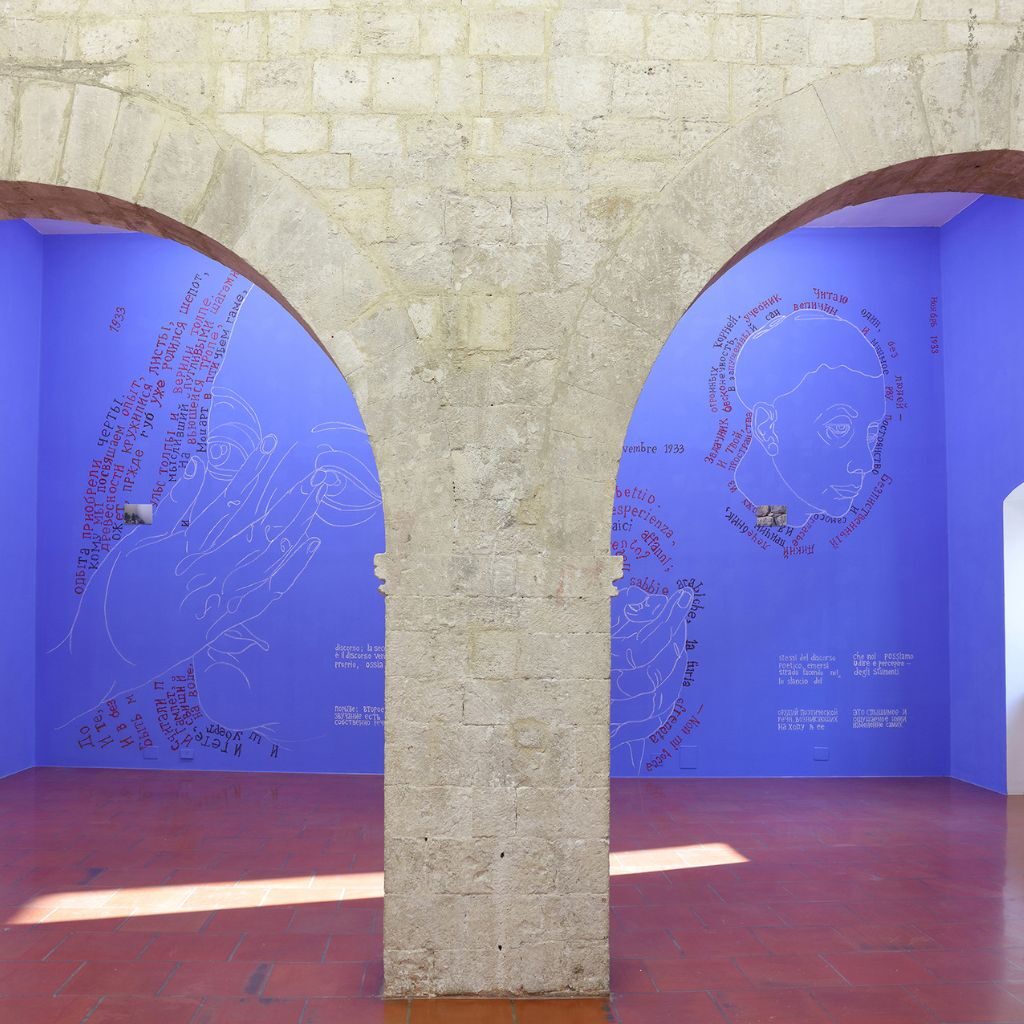On 30 October 2019 Doppelgaenger Gallery is pleased to invite you to the opening at 7pm of the one-man show by Giuseppe Caccavale Figure Poems curated by Chiara Bertola. On the walls of the gallery space Caccavale “translates” in figures the words that the great Russian poat Osip Mandel’stam dedicated to Dante in his well known Conversations. To these figures he unites verses from Mamdel’stam’s poems in “Octaves”; and between the words and figures drawn on the walls, he brings together images of photographs taken in Armenia, which have always bean an integral part of his work. He has painted the walls of the gallery a sky blue colour, bringing the fresh air inside and expanding the space, as if a celestial vault had opened up, or, in the words of the artist himself, a “celestial palate”. On the blue he has drawn large figures in oil pastels inspired by the works of the Benedictine monks and artists Rabano Mauro and Opicino de Canistris, and in hard pastels, like a superimposed cartouche, he has drawn the words taken fram Conversation on Dante giving them shape and form. A project in which the artist brings to fruition a long studio undertaking and visions expressed for years through his teachings at the Ecole Nationale Superieure des Arts Décoratifs in Paris as well. In the ample space of the gallery, every element, every image, word, rhyme, figure, association, is connected in the grand fresco now taking shape on the walls. A constellation of “figure poams” where “everything’ resonates and connects between one historical time and another, between the lives of two poets who shared a condition of exile in their own homeland. A theme alive and relevant today, whose re—presentation by an artist like Caccavale — who has found refuge for many years in France — opens up a further powerful significance: sometimes it’s a matter of being an exile from one’s own time, of a sensibility that makes us strays in order to continue living. For some years now, the artist has chosen to challenge himself with the words of poets, bacause he has gleaned that the poetic word is complex, and its truth lies not in immediacy, but in life over time. Indeed, if changes tims, because it unites past and future Today words are light, because they are written virtually, they have no weight and they disappear with the touch of a button or a screen. They can be multiplied, reproduced, copied, and modified. Giuseppe Caccavale, on the other hand, has decided to engrave and draw them on walls. He enlarges them in monumental graphite designs; he gives them a home and lets them emerge within a new language. On the walls, therefore, only words and figures reveal themselves to our gaze. “No lesson in style, no way of seeing. Butbooks opened to the sky in order to see ‘out loud’, in order to give voice to the eyes.” The project has bean conceived by Caccavale specifically for Doppelgaenger Gallery in Bari, transforming it into “a school without desks, a school in which we are standing, in which our eyes scale the walls of the marvellous, the marvel of being in the service of a task for others. We give shape and form to words in order to rediscover Dantes. Not in Hell, nor in Purgatory, nor in Paradise…but at home.” In the dialogue published in the catalogue, between Chiara Bertola, exhibition curator, and Giuseppe Caccavale, we read: For you a letter, a word, is an abject. You have arrived at an incredible synthesis and it seems to me that | see the same magnificant obsession that Cezanne had when he looked at and painted Saint Victoire, the same dedication with which Morandi painted his bottles. What led you to the relation with Mandelstam’s words? It seams to me that Mandelstam’s poems are your Saint Victoire and your bottles. You treat tham like objects… | like to think that | place myself before a poem just as the geologist Paul Cezanne placed himself in front of Sainte Victoire mountain in Provence; likewise, it seems to me that | draw and excavate letters on a wall just as Giorgio Morandi painted his objects. | discovered the work of the Russian poet Osip Mandelstam by reading the German-speaking poet, Paul Celan, who lived in Paris. It was the beginning of the nineties, | was in Ghentin Flanders to study Canto and the Flemish Primitives.
Carmi Figurati
Giuseppe Caccavale
October 30, 2019 - January 30, 2020
